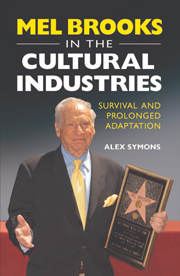Book contents
- Frontmatter
- Contents
- Acknowledgements
- Introduction
- 1 Rethinking Adaptation Studies: Survival Strategies in the Cultural Industries
- 2 From Sitcoms to ‘Parody-coms’: Writing for American TV, 1949–89
- 3 Prolonged Stardom: Audio Records, TV and Film, 1961–2004
- 4 Recycled Hollywood for the TV Generation: The Rise of Parody and the Fall of Mel Brooks the Director, 1974–95
- 5 The Integration of the Film and Theatre Industries: The Producers, 1968–2007
- Conclusion
- Bibliography
- Index
2 - From Sitcoms to ‘Parody-coms’: Writing for American TV, 1949–89
Published online by Cambridge University Press: 05 August 2013
- Frontmatter
- Contents
- Acknowledgements
- Introduction
- 1 Rethinking Adaptation Studies: Survival Strategies in the Cultural Industries
- 2 From Sitcoms to ‘Parody-coms’: Writing for American TV, 1949–89
- 3 Prolonged Stardom: Audio Records, TV and Film, 1961–2004
- 4 Recycled Hollywood for the TV Generation: The Rise of Parody and the Fall of Mel Brooks the Director, 1974–95
- 5 The Integration of the Film and Theatre Industries: The Producers, 1968–2007
- Conclusion
- Bibliography
- Index
Summary
Mel Brooks's career as a writer for American television comedy from 1949 through to 1989 has already been documented in the existing biographies and critical studies to include a mixture of perceived ‘hits’ and ‘misses’. As Bill Adler and Jeffrey Feinman note in Mel Brooks: The Irreverent Funnyman (1976), it was during the 1950s, working amid a team of writers on long-running television variety shows for Sid Caesar that Brooks ‘reached a peak of productivity’. Then, years later, with his own sitcom project When Things Were Rotten (ABC, 1975), Brooks created his first short-lived television show – blamed on his perceived ‘lack of judgement’. Yet despite this coverage, Brooks's underlying adaptation strategy in writing these television shows – which brought about this mixture of successes and perceived ‘failures’ throughout his long career – has not yet been identified. Furthermore, the significance of Brooks's adaptation production strategy in terms of the early development of American television comedy and its historical development since, specifically that of the American sitcom, is still yet to be recognised.
By rethinking Brooks's career as a television writer with a focus on his adaptation strategy, and by examining his projects within the academic approach of the cultural industries, the profound industrial significance of Brooks's projects is made clear. As I explain, Brooks's shows as an American television writer all exhibit one reoccurring adaptation strategy, in short, that of hybridising the television tradition of ‘domestic skits’ with various different kinds of Hollywood and European film content.
- Type
- Chapter
- Information
- Mel Brooks in the Cultural IndustriesSurvival and Prolonged Adaptation, pp. 48 - 78Publisher: Edinburgh University PressPrint publication year: 2012



